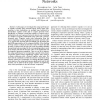Free Online Productivity Tools
i2Speak
i2Symbol
i2OCR
iTex2Img
iWeb2Print
iWeb2Shot
i2Type
iPdf2Split
iPdf2Merge
i2Bopomofo
i2Arabic
i2Style
i2Image
i2PDF
iLatex2Rtf
Sci2ools
GLOBECOM
2006
IEEE
2006
IEEE
Outage Performance of Cognitive Wireless Relay Networks
— In this paper, we investigate the outage performance of cognitive wireless relay networks where source nodes communicate to their destinations via multiple hops facilitated by intermediate cognitive nodes able to acquire spectrum holes. Specifically, we consider a model that consists of a source node, a destination node, and a group of network clusters each consisting of a number of cognitive (unlicensed) relay nodes and a primary (licensed) node. Cognitive nodes relay information from the source depending on their geographical proximity and their ability to acquire the spectrum hole successfully. We investigate the high SNR approximation of the outage probability of the resulting two-hop system to obtain the diversity order. We show that full diversity is achieved only if each relay node successfully identifies the spectrum hole unoccupied by the corresponding primary node in the cluster, and that the diversity order can be significantly less for imperfect spectrum acquisition....
Related Content
| Added | 11 Jun 2010 |
| Updated | 11 Jun 2010 |
| Type | Conference |
| Year | 2006 |
| Where | GLOBECOM |
| Authors | Kyounghwan Lee, Aylin Yener |
Comments (0)

